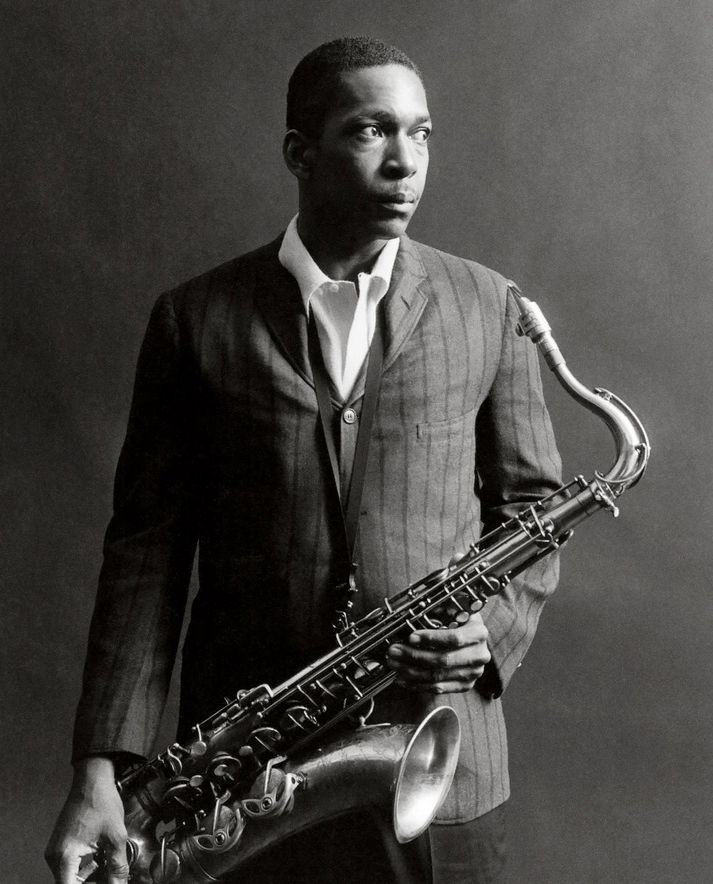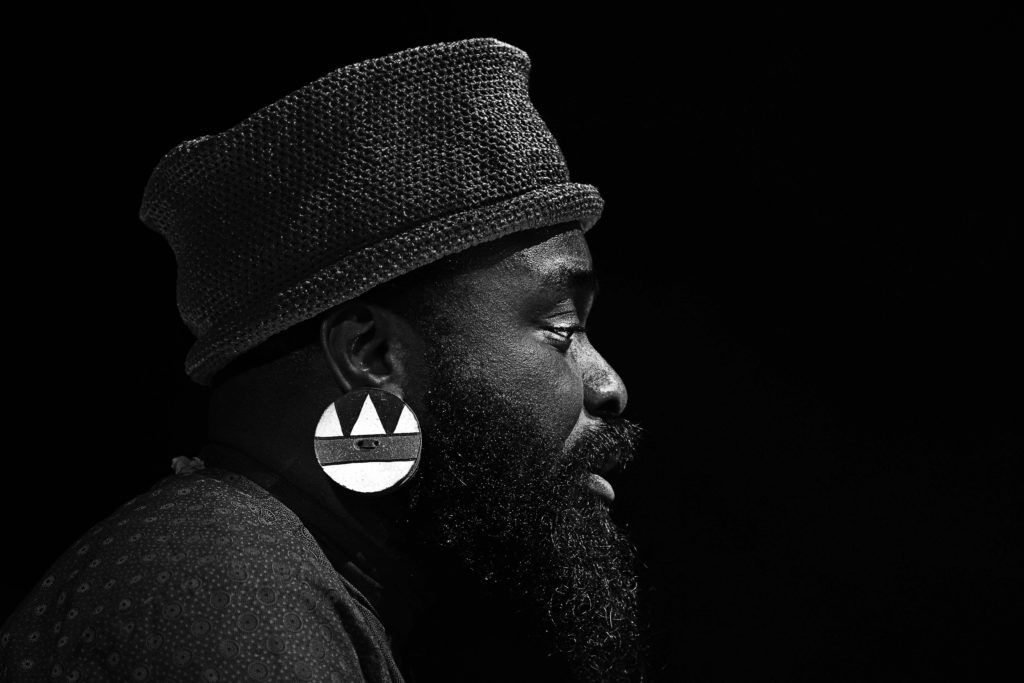NDUDUZO MAKHATHINI
Uyisithunywa Esihle (John Coltrane)

This one time I listened to Trane, travelled so far and almost never came back. Afterwards, I was in such a shock and needed to share what I had just experienced with someone. I went to a friend, a master whom himself was a huge Trane disciple. Subsequent to his intense listening to what I had to share, he calmly responded: ‘…You shouldn’t have come back, this world is not for us’. Well, to this day I am still processing this statement, some days it makes sense and other days layers of confusion.
Ngesinye isikhathi ngike ngalalela u-Trane, ngayakude kakhulu ngaze ngacishe ngangabuya. Emva kwalokho, ngangethukile kakhulu ngidinga ukuxoxisana nothile ngalokhu esengikubonile. Ngaya kumngani, ungoti ngokwakhe ongumlandeli omkhulu ka-Trane. Kulandela ukulalelisisa lokho ebengikusho, ngomoya ophansi uphendule wathi: ‘…Bekungamele ubuye, lomhlaba akusiwo owethu’. Kahle, kuzekube yinamhlanje ngisadingida lenkulumo, ngezinye izinsuku iyawenza umqondo kanti ngezinye yakha ungwengwezi lokudideka.
But for now, let me speak briefly about how I encountered Trane’s music and perhaps get into what it represents to me. I met Trane through his music, more specifically his album A Love Supreme (1965) which I had discovered in the library during my studies at Technikon Natal. This is perhaps the first jazz record I had ever listened to right to the end without feeling lost, it felt as though Trane (through this record) understood my people, knew my village, our chants and dances. In many ways, the experience of listening to this record took me back to the various ceremonies and rituals I had attended in my upbringing, there was some sort of inexplicable familiarity around it. It was a transcendental experience overlapping the concept of time and space. The record gave me lots of hope, in this new journey of becoming an improvisor at least through an instrument this time around.
Kodwa ke okwamanje, akengikhulume kafushane ngokuthi ngahlangana kanjani nomculo ka Trane mhlambe ngingene nasekutheni umeleni kimina, ngahlangana no Trane ngomculo wakhe, ikakhulukazi i-albhamu yakhe ethi A Love Supreme (1965) engayithola emtapweni wezincwadi ngesikhathi ngisewumfundi e-Natal Technikon. Leli mhlambe i-rekhodi lokuqala lomculo we-jazz engalilalela laze lafika ekupheleni ngaphandle kokulahleka, kwakuzwakala sengathi u-Trane (ngaleli rekhodi) uyabaqonda abantu bami, uyasazi isigodi sami, ukucula kwethu nemidanso. Ngezindlela eziningi, isipiliyoni sokulalela leli-rekhodi kwangithatha kwangibeka emicimbini kanye namasiko engikhule ngiwahambela ekukhuleni kwami, bekunokujwayeleka okufuna ukuphumela obala ngawo. Bekuwumuzwa obabazekayo owedlulayo kumqondo wesikhathi nomkhathi. Leli rekhodi linginike ithemba eliningi, kuloluhambo lokuba ngumciciyeli(improvisor) yize noma kwenziwa ngezinsimbi zomculo(instrument) ngaleso sikhathi.
It is crucial to note that before this experience, I had no background in jazz music. All I knew was the singing of the birds, and other natural sounds. I also knew the different repertoires from a range of traditional musics that my people sang. There is a connection between Trane (his music) and my grandmother.
Kubalulekile ukuqonda ukuthi ngaphambi kwalesisigameko, bengingazi lutho ngomculo we-jazz. Ebengikwazi nje bekuwumculo wezinyoni, kanye neminye imisindo yemvelo. Bengazi futhi izinhlobonhlobo ezahlukene zomculo wesintu obuculwa isizwe sami. Kunokuxhumana phakathi kuka-Trane(nomculo wakhe) kanye noGogo wami,
Ugogo (grandma) is an integral member of any black community and more so in an African context. Ogogo are probably some of the greatest teachers of all times. Among other teachings from grandma was being taught and made to experience the power of music and how it aligns humans to various spheres of consciousness. Meaning, before I went to ‘study’ music, I already knew that through sound it was possible to tune into other frequencies and tap into some kind of parallel existence. In other words, this is the feeling I got from listening to A Love Supreme and later other Trane recordings that came after.
Ugogo (grandma) uyilunga elibalulekile kuyoyonke imiphakathi emnyama ikakhulukazi ngokwase-Afrika. Ogogo kungenzeka bango-thisha abakhulu ngezikhathi zonke. Esinye sezifundo zikagogo wami angifundisa sona wangenza futhi ngibe nesipiliyoni somculo kanye nokuthi uhlangabezana kanjani nezimo ezahlukene zokwazi. Okushukuthi, ngaphambe kokuba ngiyo’funda’ umculo, ngasengivele ngazi ukuthi ngomsindo uyakwazi ukuvula amanye ama-‘frequencies’ uzixhume kwenye impilo ehambisanayo. Ngamanye amazwi, lona umuzwa engawuthola ngokulalela i ‘A Love Supreme’ kanye namanye ama-rekhodi ka-Trane alandela ngemuva.
Now back to my initial story about intense listening to Trane. As part of preparing for a concert that took place at the Joy of Jazz, I went back to Trane: in fact I religiously feel a need to go back to Trane. Partly, this time around it is because I felt that doing a collaboration with a great master such as Azar Lawrence who has worked with McCoy Tyner among others, Trane would be central and a perfect point of departure to new spheres. So, I went back to my collection and found mostly the post-A Love Supreme recordings of Trane, I listened intensely. I went really far beyond the stars and deep in the underworlds. Strangely enough this time I had no fear, I guess it has to do with where my journey has taken me over the years. I had to confront the existence of other worlds.
Manje asibuyele kulendaba yami nokulalelisisa okujulile u-Trane. Njengengxenye yokulungiselela ikhonsathi ebiyenzeka kwi Joy of Jazz, ngabuyela emuva ku-Trane: eqinisweni ngiye ngizizwe ngidinga ukubuyela ku Trane. Ikakhulukazi, ngalesisikhi ngoba ngizwe ukuthi ukuhlanganyela nongoti ofana no Azar Lawrence osesebenze no McCoy Tyner phakathi kwabanye, u-Trane angaba insika kanye nephuzu elifanele uma uya ezindaweni ezinstha. Ngiye ngaphindela kumaqoqo ami lapho ngithole umculo olandela ukuqoshwa kwe-A Love Supreme ka Trane, ngilalele ngalalelisisa. Ngiye kude okwedlula izinkanyezi nasekujuleni emihlabeni engaphansi. Okumangazayo ngalesisikhathi bengingenako ukwesaba, ngiyasola lokhu kuhlangene nokuthi uhambo lwami selungiyisephi eminyakeni eyedlule. Bekumele ngibhekane nokubakhona kweminye imihlaba.
This morning I woke up from a dream, and I had forgotten most parts of it but as I go through the day in Trane’s company I am constantly re-membering parts of this beautiful dream. I remember seeing Trane, he played with us and my whole entire village knew his music and he knew our music too. Another part I recall is, there were no amplifications, but sound travelled over the mountains to other villages, they too were singing the same songs and we could hear and feel their pulse.
Namhlanje ekuseni ngivuke ephusheni, kanti besengikhohlwe okuningi kwalo kodwa ngenkathi kuqhubeka usuku ngilalele uTrane ngiya ngokukhumbula izingxenye zaleliphupho elihle. Ngiyakhumbula ngibona uTrane, wadlala nathi kanti isigodi sami sonke besiwazi umculo wakhe kanti naye ubewazi umculo wethu. Enye ingxenye engiyikhumbulayo, bekungekho ukukhuliswa komsindo(amplification,) kodwa umsindo uhambe phezu kwezintaba nezinye izigodi, nazo bezicula amaculo afanayo futhi besizwa ukushaya kwazo.
Mr John William Coltrane for being a faithful messenger for our people in the diaspora, motherland and other worlds, we acknowledge your eternal presence.
Umnumzane John WIlliam Coltrane ngokuba isithunywa esithembekile ebantwini bethu kwi-diaspora, ezwenikazi kanye nakweminye imihlaba, siyakubona ubukhona bakho obungunaphakade.
Siyathokoza, Nduduzo Makhathini

Blue Note South African signee, Pianist Nduduzo Makhathini performing at the Paris/New York Heritage Festival at The Soweto Theatre in Jabavu. 08/06/2019 Photo: Hugh Mdlalose
first published on the author’s blog.
re-published with kind permission of the author
photograph of Coltrane by Chuck Stewart, first published in The New Yorker here: